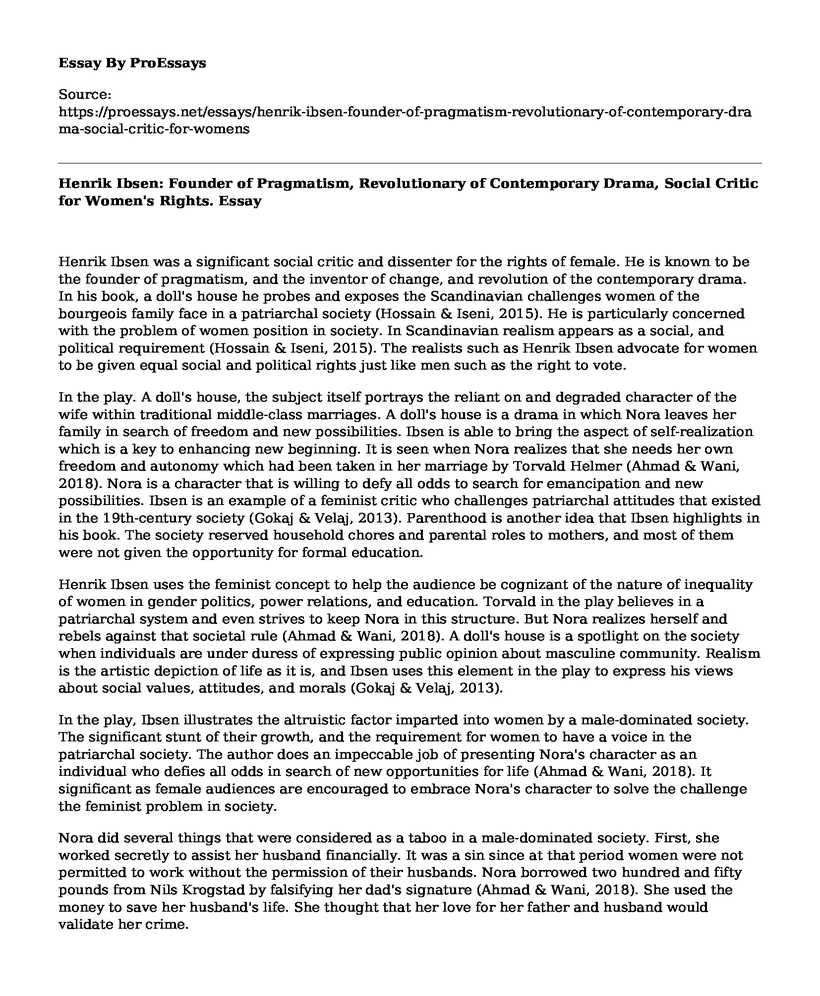Henrik Ibsen was a significant social critic and dissenter for the rights of female. He is known to be the founder of pragmatism, and the inventor of change, and revolution of the contemporary drama. In his book, a doll's house he probes and exposes the Scandinavian challenges women of the bourgeois family face in a patriarchal society (Hossain & Iseni, 2015). He is particularly concerned with the problem of women position in society. In Scandinavian realism appears as a social, and political requirement (Hossain & Iseni, 2015). The realists such as Henrik Ibsen advocate for women to be given equal social and political rights just like men such as the right to vote.
In the play. A doll's house, the subject itself portrays the reliant on and degraded character of the wife within traditional middle-class marriages. A doll's house is a drama in which Nora leaves her family in search of freedom and new possibilities. Ibsen is able to bring the aspect of self-realization which is a key to enhancing new beginning. It is seen when Nora realizes that she needs her own freedom and autonomy which had been taken in her marriage by Torvald Helmer (Ahmad & Wani, 2018). Nora is a character that is willing to defy all odds to search for emancipation and new possibilities. Ibsen is an example of a feminist critic who challenges patriarchal attitudes that existed in the 19th-century society (Gokaj & Velaj, 2013). Parenthood is another idea that Ibsen highlights in his book. The society reserved household chores and parental roles to mothers, and most of them were not given the opportunity for formal education.
Henrik Ibsen uses the feminist concept to help the audience be cognizant of the nature of inequality of women in gender politics, power relations, and education. Torvald in the play believes in a patriarchal system and even strives to keep Nora in this structure. But Nora realizes herself and rebels against that societal rule (Ahmad & Wani, 2018). A doll's house is a spotlight on the society when individuals are under duress of expressing public opinion about masculine community. Realism is the artistic depiction of life as it is, and Ibsen uses this element in the play to express his views about social values, attitudes, and morals (Gokaj & Velaj, 2013).
In the play, Ibsen illustrates the altruistic factor imparted into women by a male-dominated society. The significant stunt of their growth, and the requirement for women to have a voice in the patriarchal society. The author does an impeccable job of presenting Nora's character as an individual who defies all odds in search of new opportunities for life (Ahmad & Wani, 2018). It significant as female audiences are encouraged to embrace Nora's character to solve the challenge the feminist problem in society.
Nora did several things that were considered as a taboo in a male-dominated society. First, she worked secretly to assist her husband financially. It was a sin since at that period women were not permitted to work without the permission of their husbands. Nora borrowed two hundred and fifty pounds from Nils Krogstad by falsifying her dad's signature (Ahmad & Wani, 2018). She used the money to save her husband's life. She thought that her love for her father and husband would validate her crime.
In conclusion, Ibsen advocates for females to be given equal social, and political rights. The main motif from the play is to depict the hooked on and degraded role of the wife within traditional middle-class marriages. Nora gains self-actualization and leaves aside her family in search of new opportunities, and freedom. The other themes that are demystified include marriage and parenthood.
References
Ahmad, R. & Wani, R. A. (2018). The Concept of Feminism in Henrik Ibsen's A Doll's House. Retrieved from: https://pdfs.semanticscholar.org/d920/19bda664ca06b18995db8557a5892eb96e37.pdf
Gokaj, R., & Velaj, O. (2013). The Socio-Political Aspect in Ibsens Plays. Mediterranean Journal of Social Sciences, 4(11), 676. Retrieved from: file:///C:/Users/User/Downloads/1356-5409-1-PB.pdf
Hossain, A., & Iseni, A. (2015). Symbolic Realism in Ibsen's A Doll's House: An Overview. ANGLISTICUM. Journal of the Association-Institute for English Language and American Studies, 3(8), 8-17. Retrieved from: file:///C:/Users/User/Downloads/HossainAIseniA.pdf
Cite this page
Henrik Ibsen: Founder of Pragmatism, Revolutionary of Contemporary Drama, Social Critic for Women's Rights.. (2023, Feb 06). Retrieved from https://proessays.net/essays/henrik-ibsen-founder-of-pragmatism-revolutionary-of-contemporary-drama-social-critic-for-womens
If you are the original author of this essay and no longer wish to have it published on the ProEssays website, please click below to request its removal:
- Function of Government in the Cases of Tragedy of Commons Essay
- Thirst and Desire for Knowledge: By the Waters of Babylon Essay
- Essay Example on Daily Work: The Meaning of Life
- The Character Analysis of Hector in Homer's Iliad Essay Example
- Essay on Communicative Competence: Hymes' (1972) Revolutionary Concept in English Language Teaching
- The Value of Human Relationship: Philosophical Perspectives - Essay Sample
- Essay Sample on Sadiqa Khan's Journey to Understand Race & White Privilege







